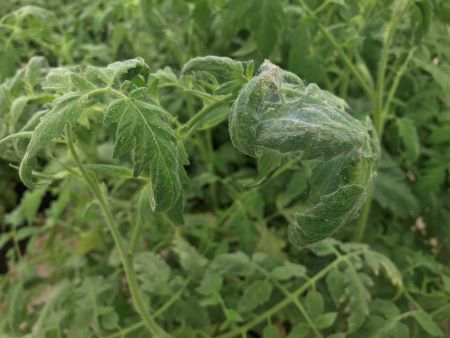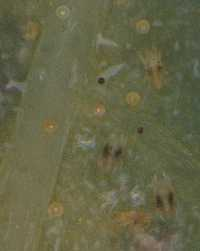Spider mites

The two-spotted spider mite is a common pest in the area's yards, gardens, and houseplants. Spider mites are a type of arachnid related to spiders, ticks, and scorpions. These tiny mites feed on the sap of the leaves and needles of plants and cause bruising with their mouth parts as they feed. This feeding leads to a speckled appearance on the leaf of a plant and can eventually lead to the death of the plants if the infestation is severe enough. The picture on the right is an eggplant leaf showing signs of a heavy infestation. Spider mites prefer warm weather, and the population can quickly explode during hot and dry weather periods, with the mites maturing from an egg to an adult in as little as a week.
Because of their size, spider mites can often hide in plain sight until they start causing visible damage to the plants they have infested. The mites usually form webs on the bottom of leaves or where the leaves connect to the stem, often the first sign that something is wrong. You can also check for spider mites by holding a piece of white paper under the leaf and tapping on the leaf. If there are small mobile specks, you likely have spider mites.

Treating spider mites can be difficult as many typical insecticides have little effect on the mite but will kill the natural predators, helping keep the population under control. This can lead to an explosion rather than a reduction in the population. Many beneficial insects feed on spider mites, including small lady beetles, predatory mites, and minute pirate bugs. You can often purchase beneficial predators for spider mites as an organic option to help control the populations. Other non-chemical ways to reduce the population include spraying the plants periodically with streams of water and watering often to prevent drought stress, which can lead to an increased population and damage. If needed, some chemical options include those with the active ingredients bifenthrin or acephate, which offer some control of spider mites. Horticultural oils, specifically the summer version (not the dormant version, which should only be used during the dormant season), are probably the most effective option for homeowners to control spider mites.

Have questions? Contact our office where our Horticulture Extension Agent will assist you with questions.
Phone: (316) 321-9660
Email: callae@ksu.edu